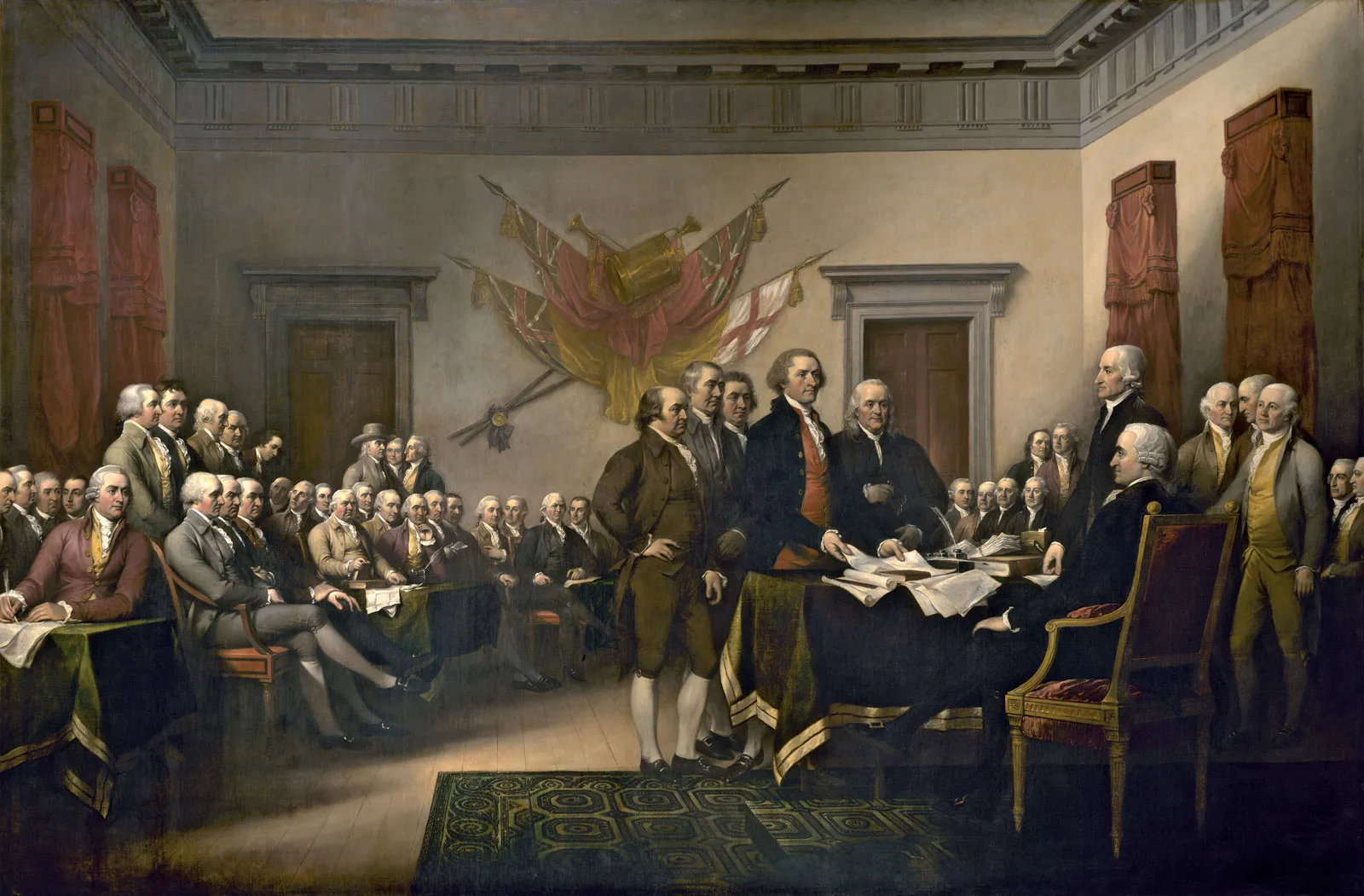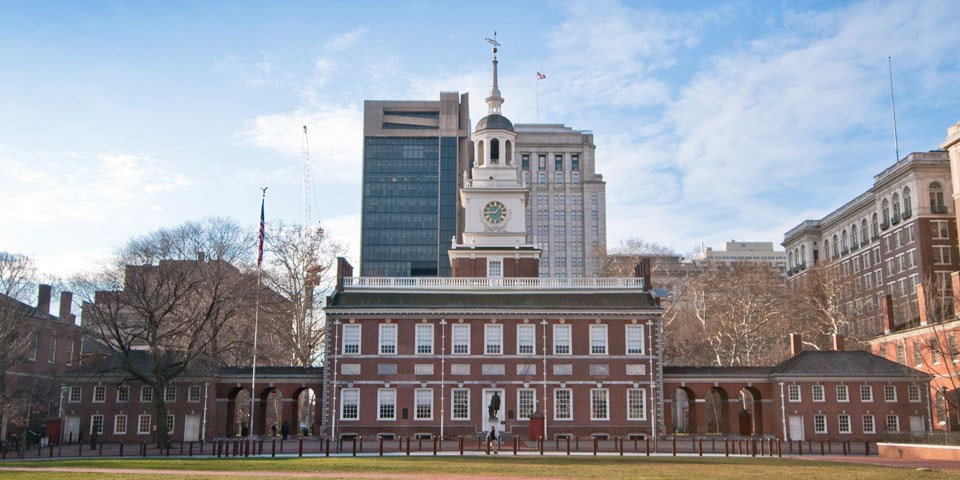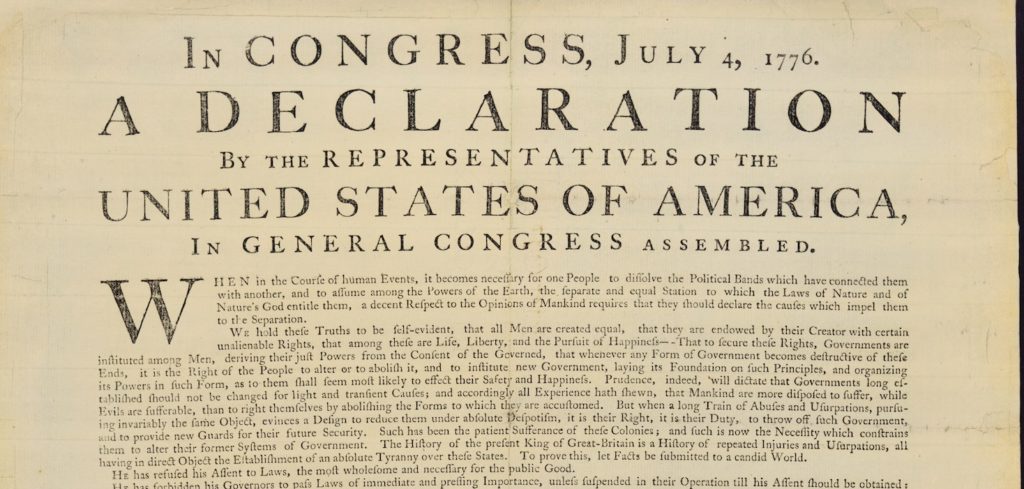On July 4, 1776, the Second Continental Congress unanimously adopted the Declaration of Independence, announcing the colonies’ separation from Great Britain. The Constitution provides the legal and governmental framework for the United States. However, the Declaration, with its eloquent assertion “all Men are created equal,” is equally beloved by the American people.

Philadelphians marked the first anniversary of American independence with a spontaneous celebration, which is described in a letter by John Adams to his daughter, Abigail. However, observing Independence Day only became commonplace after the War of 1812. Soon, events such as groundbreaking ceremonies for the Erie Canal and the Baltimore and Ohio Railroad were scheduled to coincide with July 4th festivities.

In 1859, the Banneker Institute of Philadelphia, Pennsylvania, urged African Americans to celebrate Independence Day while bearing witness to the inconsistencies between the ideals espoused in the Declaration of Independence and the practice of slavery. Chairman of the meeting, Mr. Jacob C. White Jr., also promised his audience a brighter future:
We have learned by experience and by the comparison of ourselves with people similarly situated, to hope that, at some day not very far in futurity, our grievances will be redressed, that our long lost rights will be restored to us, and that, in the full stature of men, we will stand up, and with our once cruel opponents and oppressors rejoice in the Declaration of our common country, and hail with them the approach of the glorious natal day of the Great Republic.
Mr. Jacob C. White Jr., Introductory Remarks. In The Celebration of the Eighty-Third Anniversary of the Declaration of American Independence by the Banneker Institute…July 4, 1859. Philadelphia: W.S. Young, 1859. p.8 African American Perspectives: Materials Selected from the Rare Book Collection. Rare Book & Special Collections Division

By the 1870s, the Fourth of July was the most important secular holiday on the calendar. Congress passed a law making Independence Day a federal holiday on June 28, 1870. Even far-flung communities on the western frontier managed to congregate on Independence Day.
In an American Life Histories: Manuscripts from the Federal Writers’ Project, 1936 to 1940 interview, Miss Nettie Spencer remembered the Fourth as the “big event of the year. Everyone in the countryside got together on that day for the only time in the year.” She continued:
There would be floats in the morning and the one that got the [girls?] eye was the Goddess of Liberty. She was supposed to be the most wholesome and prettiest girl in the countryside — if she wasn’t she had friends who thought she was. But the rest of us weren’t always in agreement on that…Following the float would be the Oregon Agricultural College cadets, and some kind of a band. Sometimes there would be political effigies.
Just before lunch – and we’d always hold lunch up for an hour – some Senator or lawyer would speak. These speeches always had one pattern. First the speaker would challenge England to a fight and berate the King and say that he was a skunk. This was known as twisting the lion’s tail. Then the next theme was that any one could find freedom and liberty on our shores. The speaker would invite those who were heavy laden in other lands to come to us and find peace. The speeches were pretty fiery and by that time the men who drank got into fights and called each other Englishmen. In the afternoon we had what we called the ‘plug uglies’ — funny floats and clowns who took off on the political subjects of the day…The Fourth was the day of the year that really counted then. Christmas wasn’t much; a Church tree or something, but no one twisted the lion’s tail.
“Rural Life in the 1870s”. Miss Nettie Spencer, interviewee; Walker Winslow, interviewer; Portland, Oregon, December 15, 1938. American Life Histories: Manuscripts from the Federal Writers’ Project, 1936 to 1940. Manuscript Division



Down South the celebration was much the same. Ninety-six-year-old Dr. Samuel B. Lathan recalled the Independence Day celebrations of his South Carolina childhood:
The Fourth of July was observed at Caldwell Cross Roads. The military companies of infantry would assembly here from the surrounding counties making up a brigade. A drill and inspection were had, and a dress parade followed. There was an old cannon mounted on the field. The honor of firing it was assigned to Hugh Reed, who had been in the artillery of Napoleon’s army at Waterloo and afterward emigrated to South Carolina. A great barbecue and picnic dinner would be served; candidates for military, state, and national offices would speak; hard liquor would flow; and each section would present its ‘bully of the woods’ in a contest for champion in a fist and skull fight. Butting, biting, eye gouging, kicking, and blows below the belt were barred. It was primitive prize fighting.
“Dr. Samuel B. Lathan”. W. W. Dixon, interviewer; Winnboro, South Carolina, June 28, 1938. American Life Histories: Manuscripts from the Federal Writers’ Project, 1936 to 1940. Manuscript Division


Use the online resources of the Library of Congress to learn more about Independence Day and the Declaration of Independence.
Learn More
- View a selection of images that reflect on the celebrations as well as the complications of American Independence Day in the Free to Use and Resuse: Independence Day set.
- The Library of Congress posts a wealth of online information pertaining to the Declaration of Independence and its principal author, Thomas Jefferson. Declaring Independence: Drafting the Documents provides a Timeline leading up to the revolution and a fragment of an early draft of the Declaration. Also, see the Thomas Jefferson Papers, 1606 to 1827, which includes Jefferson’s rough draft of the Declaration of Independence.
- A Century of Lawmaking for a New Nation: U.S. Congressional Documents and Debates, 1774-1875 contains congressional information concerning the Declaration of Independence in the Journals of the Continental Congress and the Letters of Delegates to Congress.
- Pioneering the Upper Midwest: Books from Michigan, Minnesota, and Wisconsin, ca. 1820 to 1910 contains wonderful Independence Day recollections. Search the collection on the phrase Fourth of July to locate many descriptions of the holiday including “Celebrating The Fourth”, a chapter of Lewis Reimann’s Between the Iron and the Pine: A Biography of A Pioneer Family and A Pioneer Town.
- See the entry for the Declaration of Independence in the Library’s Primary Documents in American History web guide series.
Source: https://www.loc.gov/item/today-in-history/july-04/



